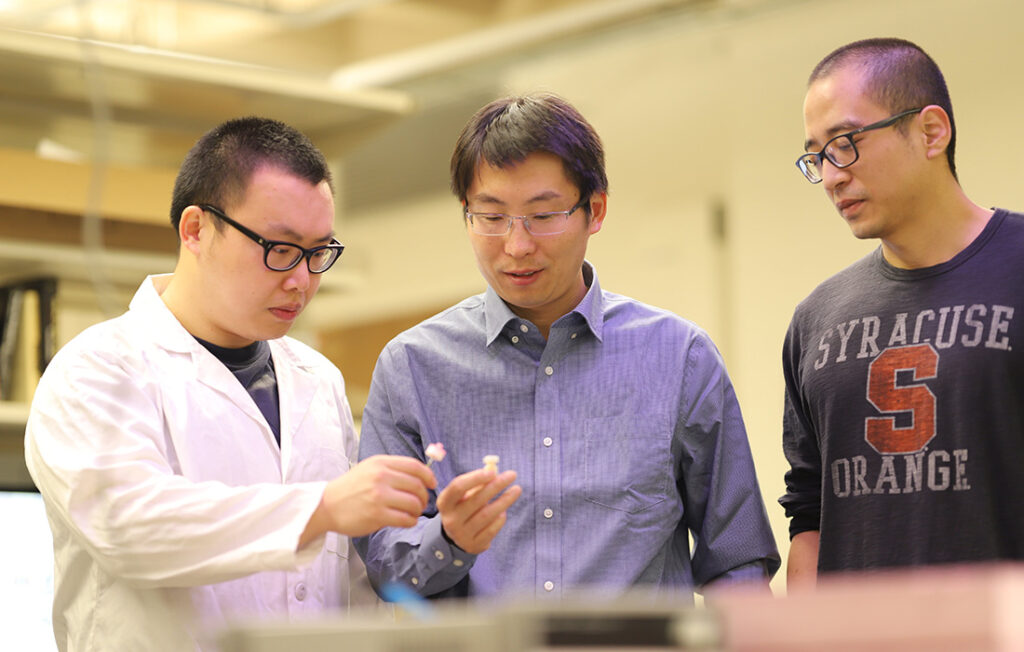
Wanliang Shan, assistant professor of mechanical and aerospace engineering at the College of Electrical Engineering and Computer Science (ECS), has received a National Science Foundation (NSF) CAREER Award to research the mechanics behind highly tunable dry adhesion for manipulating delicate and small objects.
The NSF CAREER Award supports early-career faculty with promising research and the potential to serve as academic role models. This project will significantly advance tunable adhesion for compliant manipulation, which Shan’s team has studied for the past seven years. Focused on the ability to pick up and release objects by adjusting the level of adhesion, his work has been published in high-impact journals such as Advanced Functional Materials and Advanced Materials Interfaces.
Shan’s team previously explored adhesion tuning using smart materials in soft pillars. Heating the smart material component with an electrical current, or power source, activates the device within seconds, resulting in a significant change in the adhesion of the soft pillars. This discovery earned Shan a patent which was issued in the Spring of 2022 and his team is currently working on an NSF Partnership for Innovation grant to explore the potential commercialization of this approach.
Shan’s NSF CAREER project introduces a new method for achieving tunable adhesion. Rather than using heat to activate the device, this method uses low pressure to activate adhesion which allows objects to be gripped and released efficiently at a faster rate. Shan found that a greater amount of adhesion change can be achieved within a fraction of a second compared to his previous method. This innovative approach focuses on a specific type of adhesive structure called soft hollow pillars and a provisional patent has been filed for this new approach.
The CAREER project delves deeper into understanding the mechanics behind highly tunable adhesion observed in soft hollow pillars and investigates the role of mechanical instability, specifically the buckling of thin structures under low pressure, which will give Shan insights into optimizing the design of adhesive devices. By understanding the influence of these factors, the project seeks to further improve the functionality and effectiveness of adhesive devices.
“In certain applications like manufacturing, devices need fast, repetitive movements to perform tasks,” Shan says. “In other applications, however, these devices don’t require the same movements. This is why I believe both approaches to tunable adhesion are important.”
Shan will continue incorporating findings from research into the courses he teaches at Syracuse University. Since 2019, he’s been a faculty member of ECS, where he teaches courses on solid mechanics and soft robotics. He also intends to seek internship opportunities at relevant companies for graduate students who participate in the CAREER project, a strategy he’s used to interact with industrial partners leveraging existing NSF grants. Collaborating with the Museum of Science and Technology in downtown Syracuse, he’s also proposed education and outreach initiatives such as mechanics-enabled soft robotics summer camps. These are intended to educate the general public, especially K-12 students, about his team’s research.
“There’s a significant educational aspect to this CAREER award,” Shan says. “This will be great for students and my lab at Syracuse University. I look forward to incorporating findings from this research into lecture material, both for undergrad and graduate students. The summer camps will help disseminate research outcomes to the general public and foster interest in the next generation of engineers.”
“This project not only has all the fundamentals of mechanics but also carries practical ramifications for compliant manipulation,” Shan added. “Bringing this research to my classroom and the potential impact these findings will have on technology is all very exciting. I appreciate the National Science Foundation for this award for allowing me the opportunity to carry out this exciting project.”
